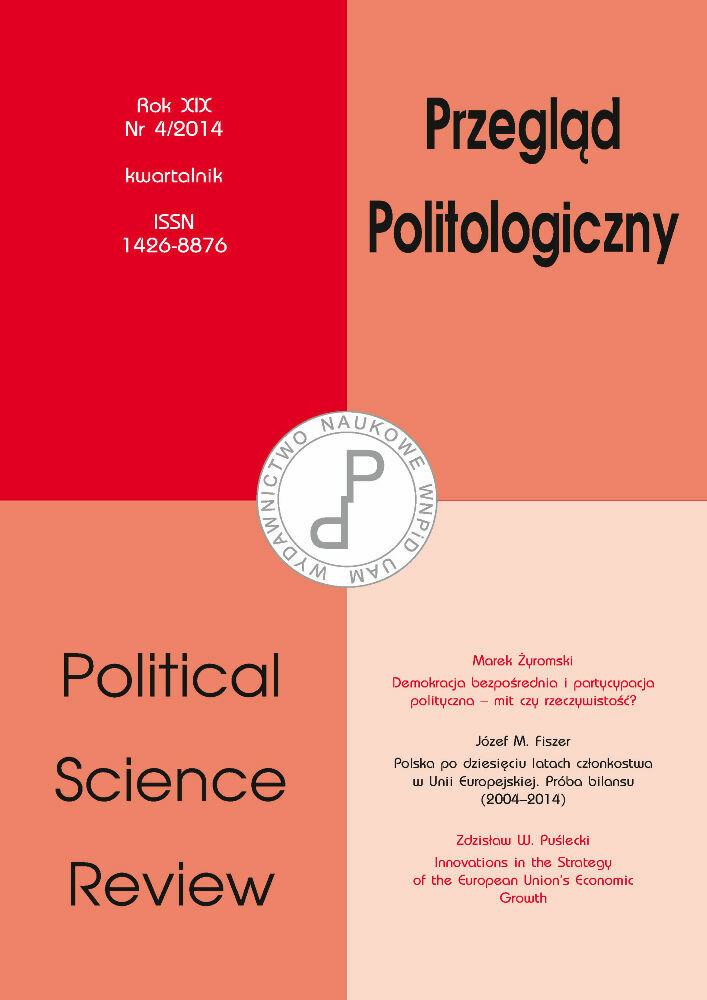Abstrakt
Artykuł stawia tezę, że silne poczucie amerykańskiej wyjątkowości, będące częścią charakteru narodowego USA rodzi również pewne negatywne implikacje na poziomie krajowym, jak i międzynarodowym. Obniżyło ono jakość dyskursu publicznego, a także wpłynęło na pozycję USA w stosunkach międzynarodowych. Recesja ekonomiczna, zaangażowanie w konflikty zbrojne oraz silne ekonomiczne i społeczne nierówności podważyły wiarygodność amerykańskiego mitu. Etyczne i duchowe zakorzenienie amerykańskiego doświadczenia może być ważnym czynnikiem odrodzenia USA. Istotną rolę dla poprawy jakości amerykańskiego dyskursu publicznego oraz wzmocnienia społeczeństwa obywatelskiego ma do odegrania edukacja.
Bibliografia
Adorno T. (2003), Education after Auschwitz, in: Can One Live after Auschwitz? A Philosophical Reader, ed. R. Tiedemann, Stanford University Press, Stanford.
A Parent’s Military Deployments Take a Major Toll on Children’s Mental Health, Study Finds (2011), “National Journal”, 4 July, http://www.nationaljournal.com/healthcare/a-parent-s-military-deployments-take-a-major-toll-on-children-s-mental-health-study-finds-20110704.
Army War College Study Provides Insight on Children with Deployed Parents (2010), “U.S. Medicine”, April, http://www.usmedicine.com/articles/army-war-college-study-provides-insight-on-children-with-deployed-parents.html.
BBC World Service, http://www.worldpublicopinion.org/pipa/pdf/mar07/BBC_ViewsCountries_Mar07_pr.pdf.
Blow Ch. M. (2011), Empire at the End of Decadence, “The New York Times”, 18 February, http://www.nytimes.com/2011/02/19/opinion/19blow.html.
Borelli S. (2005), Casting light on the legal black hole: International law and detentions abroad in the „war on terror”, “International Review of the Red Cross”, vol. 87:857, March, http://www.icrc.org/eng/assets/files/other/irrc_857_borelli.pdf.
Donoghue F. (2008), The Last Professors. The Corporate University and the Fate of the Humanities, Fordham University Press, New York.
Dorosiewicz W. (2008), The Disadvantages of an Elite Education, “The American Scholar”, Summer, http://theamericanscholar.org/the-disadvantages-of-an-elite-education/.
Eisenhower D. D. (1961), Farewell Radio and Television Address to the American People, http://www.presidency.ucsb.edu/ws/index.php?pid=12086.
Fraad H. (2010), American Depressions, “Tikkun Magazine”, January/February, http://www.tikkun.org/article.php/jan10_depressions.
Fukuyama F. (1992), The End of History and The Last Man, Avon Books, New York.
Fukuyama F. (1995), Trust: The Social Virtues and the Creation of Prosperity, Simon & Schuster, New York.
Geoghagen T. (2010), Were You Born on the Wrong Continent? How the European Model Can Help You Get a Life, The New Press, New York–London.
Gingrich N. (2011), A Nation Like No Other: Why American Exceptionalism Matters, Regnery Publishing, Washington DC.
Hauser G. (June 1998), Vernacular Dialogue and the Rhetoricality of Public Opinion, “Communication Monographs”, no. 65 (2), p. 83–107.
Hedges C. (2010), Death of the Liberal Class, Nation Books, New York.
Howard Zinn Project, http://zinnedproject.org/about.
Ignatieff M. (ed.), (2005), American Exceptionalism and Human Rights, Princeton University Press, Princeton.
Judt T. (2010), Ill Fares the Land, The Penguin Press, New York.
Klein N. (2007), The Shock Doctrine. The Rise of Disaster Capitalism, Metropolitan Books, New York.
Lakoff G. (2006), Communicating Our American Values and Vision, Farrar, Straus and Giroux, New York.
Lerner M. (1997), The Politics of Meaning. Restoring Hope and Possibility in an Age of Cynicism, Perseus Books, Reading.
Lewis S. (1935), It Can’t Happen Here, http://gutenberg.net.au/ebooks03/0301001h.html.
MacDonald D. (1995), The Root is Man, Autonomedia, New York.
McCoy T. (2012), How Joseph Stalin Invented ‘American Exceptionalism’, “The Atlantic”, 3, 15 March, http://www.theatlantic.com/politics/archive/2012/03/how-joseph-stalin-invented-american-exceptionalism/254534/.
Naomi K. (2007), The Shock Doctrine. The Rise of Disaster Capitalism, Metropolitan Books, New York.
National Center for Education Statistics, National Assessment of Adult Literacy, http://nces.ed.gov/naal/.
Niebuhr R. (2008), The Irony of American History, The University of Chicago Press, Chicago.
Page J. (2010), America’s place in the world could play part in 2012 elections, “USA Today”, 21 December, http://www.usatoday.com/news/washington/2010-12-21-1Aexceptional21_CV_N.htm.
Postman N. (1986), Amusing Ourselves to Death, Penguin Books, New York.
Putnam R. (1994), Making Democracy Work, Princeton University Press, Princeton.
Putnam R. (2000), Bowling Alone: The Collapse and Revival of American Community, Simon & Schuster, New York.
Ravitch D. (2010), The Death and Life of the Great American School System. How Testing and Choice are Undermining Education, Basic Books, New York.
Reliance on the Safety Net Rises (2011), “The New York Times”, 11 February.
Standing G. (2011). The Precariat. The New Dangerous Class, Bloomsbury Academic, London.
The Pew Research Center (2012), Trends in American Values: 1987–2012. Partisan Polarization Surges in Bush, Obama Years, http://www.people-press.org/2012/06/04/partisan-polarization-surges-in-bush-obama-years/.
Tocqueville de A. (2000), Democracy in America, University of Chicago Press, Chicago–London.
Tyller I. (2007). American Exceptionalism and Anti-Americanism, in: Anti-Americanism: History, Causes, and Themes, vol. 2: Historical Perspectives, ed. B. O’Connor, Greenwood World Publishing, Oxford, p. 99–117.
Ulbrick T. J. (2005), Tortured logic: The (Il)legality of United States interrogation practices in the war on terror, “Northwestern Journal of International Human Rights”, 5:1, http://www.law.northwestern.edu/journals/jihr/v4/n1/15/Ulbrick.pdf.
Walt S. M. (2011), The Myth of American Exceptionalism, “Foreign Policy”, November, http://www.foreignpolicy.com/articles/2011/10/11/the_myth_of_american_exceptionalism?page=full.
Wilkinson R., Pickett K. (2010), The Spirit Level: Why More Equal Societies Almost Always Do Better, Bloomsbury Press, New York.
Wilson R. J. (2003), United States Detainees at Guantánamo Bay: The Inter-American Commission on Human Rights Responds to a „Legal Black Hole”, “The Human Rights Brief”, 10:3, Spring, http://www.wcl.american.edu/hrbrief/10/3wilson.pdf.
